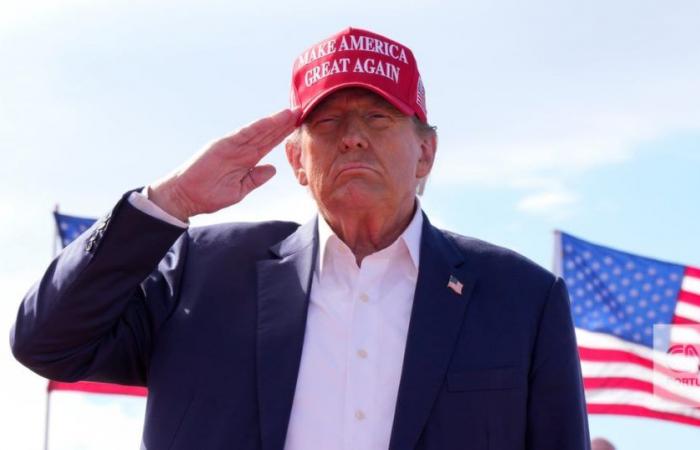
Trump promises “bloodbath” if he loses the presidential election. “Right now there is a significant group of Americans who consider the use of violence in a political context legitimate” – and not all of them are Republicans
It was a speech that made headlines around the world: over the weekend, at a political event in Ohio, Donald Trump, Republican presidential candidate, said that some migrants crossing the border from Mexico into the United States “are not people” but yes “animals”; that his supporters in the dock for the invasion of the Capitol are “unbelievable patriots” taken “hostage” by the federal State; that Joe Biden is a “stupid president” and a “son of a bitch”. In between, he said: “If I am not elected, there will be a bloodbath for everyone… it will be the minimum. It’s going to be a bloodbath for the country.”
In the midst of the campaign for the November elections, at a time when there are no doubts about a Trump-Biden rematch, the Democrat’s team wasted no time reacting. “He wants another January 6th, but the American people are going to hand him another electoral defeat in November because they continue to reject his extremism, his affection for violence and his thirst for revenge,” said James Singer, spokesman from the Biden campaign, in a statement in which he accused Trump of “doubling his threats of political violence”.
The Republican candidate’s spokesman, Steven Cheung, intervened to say that Trump was referring to the economy and the automobile industry, of great importance in Ohio, and not to a political “bloodbath”. In an official statement, Cheung accused “con artist Joe Biden and his campaign” of engaging in “misleading and out-of-context editing.”
For Diana Soller, “there are those who will see this and those who will accuse Trump of inciting violence, more or less as happened on January 6th” 2021, especially taking into account that Trump himself is also being tried on suspicion of inciting to the invasion of Congress after the 2020 presidential elections. But for the researcher at the Portuguese Institute of International Relations (IPRI), “the issue is more complex” and cannot be limited to the laws that Trump may or may not have violated with this speech.
“Donald Trump is an anti-system man who takes rhetorical liberties that we don’t think are typical of a serious politician, that’s the main conclusion”, points out Diana Soller. “His words could be interpreted as incitement to hatred, but I study politics, I don’t study laws, I don’t know to what extent he can be sanctioned for what he said. I think the most important thing, and what needs to be put on the table, is that right now there is a significant group of Americans who consider the use of violence in a political context to be legitimate.”
Proving this are recent surveys, such as one by the Public Religion Research Institute (PRRI) in partnership with the Brookings Institute released at the end of October and which indicates that almost a quarter of the North American population (23%) considers that “patriots Americans may have to resort to violence to save the country” (compared to 15% in 2021). In the same opinion survey, an overwhelming majority – 75% of respondents – said they agreed that “the future of American democracy is at risk in the 2024 presidential elections”.
“Common wisdom would say that they are all Republicans, but that is not true, the majority are Republicans but the rest are Democrats”, says Diana Soller. “There continues to be a preponderance among Republicans on this point of violence as a legitimate political weapon, but it is not exclusive to them. And I think that’s where the problem really lies – this radicalization of the American electorate regarding political issues.”
Voter mobilization in 2024
Since March 2021, PRRI, a non-partisan group that conducts opinion polls on politics, culture and religion, has carried out eight different polls on the same questions and, at the end of last year, it was the first time that support for political violence exceeded 20 %. According to the most recent survey, about a third of Republicans support violence as a way to “save America,” compared to 22% of independent voters and 13% of Democrats.
Among the Republican electorate, the differences are also abysmal, with the latest poll indicating that those who vote for Trump are three times more likely to support violence as a political weapon compared to Republicans who do not have a favorable view of the former president and candidate for the White House again. “Whether he was referring to the automobile industry or not, we are dealing with the kind of violent language that Trump often uses when speaking to his base of supporters,” says Alan Abramowitz, an expert on American domestic politics, polls and elections at Emory University.
Diana Soller agrees. “In International Relations we normally say that political discourse ends up only being truly important if there is an audience for that discourse and, in this case, there is”, says the specialist, reinforcing that, despite not being vast, “the amount of voters who see themselves in speeches of a violent nature. “It’s important to start paying attention to this. I don’t think it matters much that he is an extemporaneous politician, who speaks faster than he thinks. None of this would be of any importance if there weren’t a segment of the population that, in fact, can hear this speech as permission to carry out acts of violence in political situations that they don’t consider legitimate.”
In his speech in Ohio, Trump’s phrase about an anticipated “bloodbath” followed his promise to impose a 100% tariff on all car imports into the United States, in a clear attempt to mobilize the electorate of a state where almost 110 thousand people work in the automotive industry and which is today responsible for the manufacture of 82.5% of the total number of light vehicles made in America (and 65.5% of total production in North America).
“It generally remains ambiguous enough that it cannot be directly accused of inciting violence, but the consequences have certainly been violent, particularly on January 6th,” says Abramowitz, author of the book “Voice of The People: Elections and Voting Behavior in the United States”, when asked about the impact of this speech in light of the attack on the Capitol. “Many of his supporters seem to appreciate this kind of language, which they see as an attack on the political system and the liberals they consider their enemies.”
It is the so-called “phenomenon of electorate mobilization”, at a time when “we know that electoral campaigns are not won or lost with explanatory speeches, appealing to ideas, with electoral programs”, says Diana Soller. “Whoever wins is whoever manages to mobilize the largest number of voters and therefore these incendiary speeches end up having an advantage and a disadvantage: they have strength over the electorate that will vote, but they allow the opponent, in this case Joe Biden, to appeal to his own electorate. so that you don’t vote for someone with these characteristics.”
For this reason, the International Relations specialist considers that “Trump’s words, above all, are becoming a mobilizing issue” in the context of the current campaign, which everything indicates will be one of the closest in recent decades. “What he gains or loses with speeches of this type is not measurable, but it is strategic, in the sense that both candidates are looking for ways to mobilize their voters.”
Tags: Blood bath Trump ambiguous accused inciting violence consequences certainly violent
--




